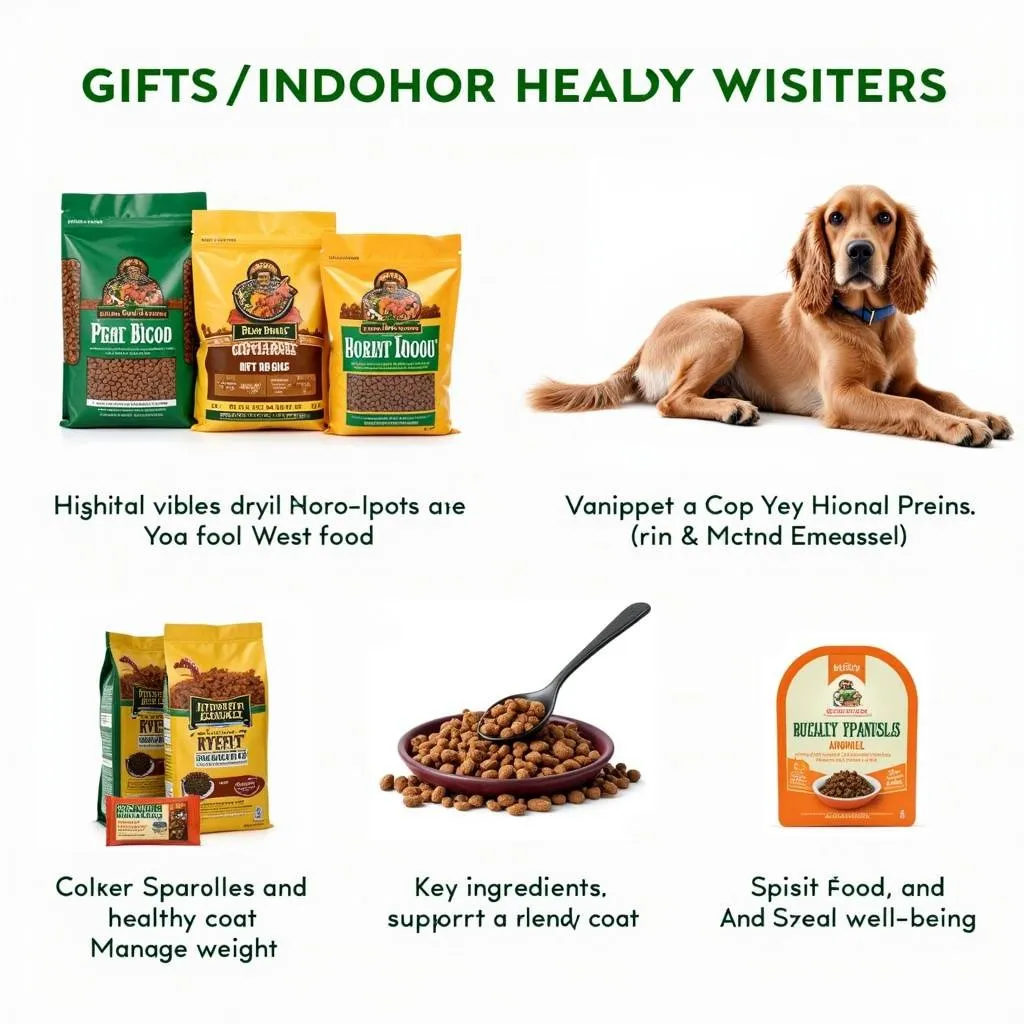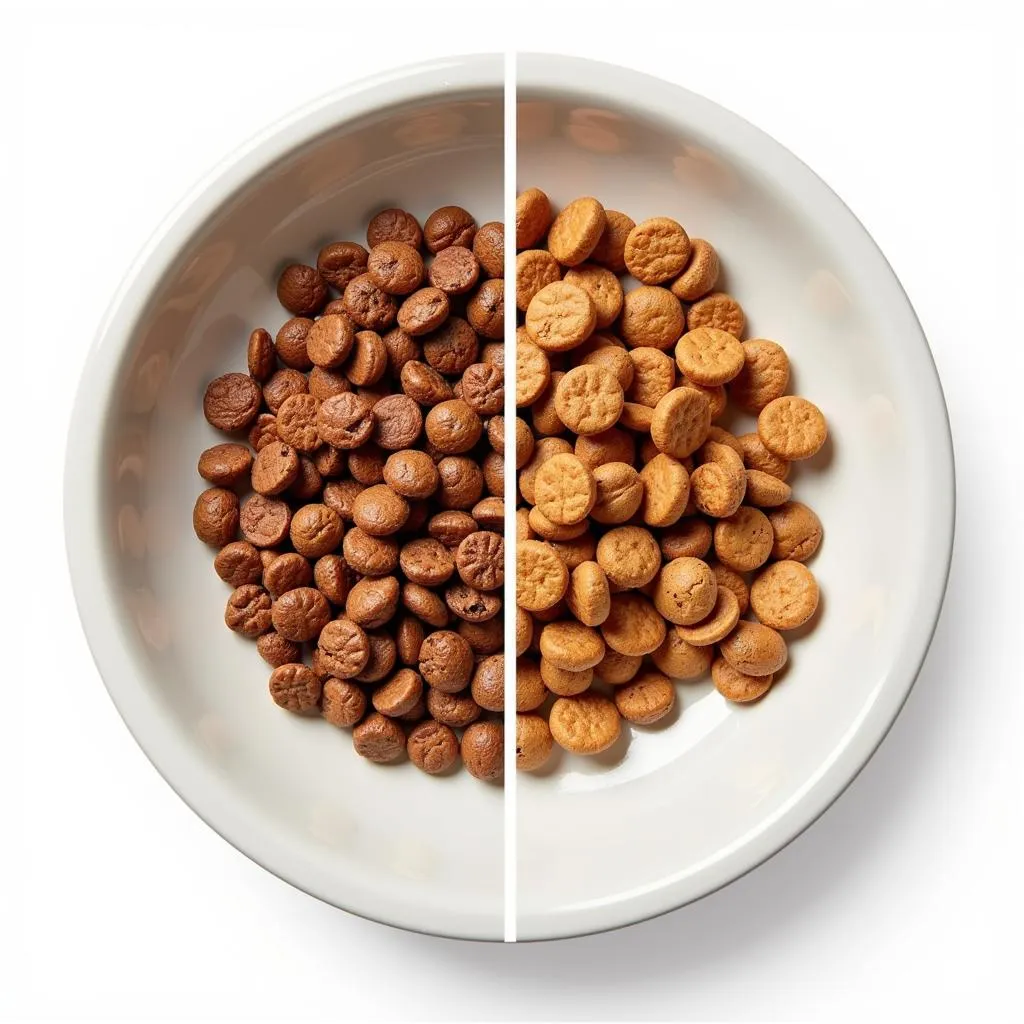Choosing the Best Food For Cocker Spaniels is a top priority for responsible pet parents. After all, a healthy diet is the foundation for a happy and energetic life. But with so many options available, it can be overwhelming to navigate the world of dog food and determine what’s truly best for your beloved Cocker.
 High-quality dog food for Cocker Spaniels
High-quality dog food for Cocker Spaniels
Understanding Your Cocker Spaniel’s Nutritional Needs
Cocker Spaniels, known for their luxurious coats and playful personalities, have specific dietary needs that differ from other breeds. As a medium-sized breed, they require a balanced diet that supports their energy levels while maintaining a healthy weight.
Here’s what to keep in mind:
- Protein Powerhouse: Cocker Spaniels thrive on a diet rich in high-quality protein to support muscle growth and maintenance. Look for food where meat, like chicken, fish, or lamb, is the primary ingredient.
- Healthy Fats for a Lustrous Coat: Those gorgeous Cocker Spaniel locks need essential fatty acids to stay healthy and shiny. Opt for food containing omega-3 and omega-6 fatty acids from sources like fish oil or flaxseed.
- Carbohydrates for Energy: While protein is key, carbohydrates provide the fuel your Cocker needs for all that tail-wagging energy. Choose complex carbohydrates like brown rice or sweet potatoes, which provide sustained energy release.
Navigating the Dog Food Aisle: Dry vs. Wet Food
The age-old debate: dry kibble or wet food? Both have their pros and cons, and the best choice often depends on your Cocker Spaniel’s individual preferences and lifestyle.
Dry Dog Food:
- Convenient and Cost-Effective: Dry kibble is a popular choice due to its affordability and ease of storage. It’s also great for promoting dental health as the crunchy texture can help remove plaque and tartar.
- Variety Abounds: From grain-free formulas to options specifically designed for sensitive stomachs, there’s a wide variety of dry dog food to suit every need.
Wet Dog Food:
- Hydration Boost: Wet food, with its higher moisture content, is an excellent choice for picky eaters or dogs who don’t drink enough water.
- Flavorful Appeal: Many dogs find wet food more appealing due to its strong aroma and texture, making it a good option for encouraging finicky pups to eat.
 Cocker Spaniel enjoying a meal
Cocker Spaniel enjoying a meal
Common Cocker Spaniel Health Concerns and Dietary Considerations
Just like humans, Cocker Spaniels can be prone to certain health conditions, some of which can be managed or even prevented with proper diet:
- Weight Management: Cocker Spaniels love their treats, and their affectionate nature often leads to extra snacks from loving owners. However, it’s crucial to monitor their calorie intake and choose a food that supports a healthy weight.
- Ear Infections: Those adorable floppy ears can trap moisture, making Cocker Spaniels susceptible to ear infections. Choosing a food rich in omega-3 fatty acids can help reduce inflammation and support overall ear health.
Decoding Dog Food Labels: A Quick Guide
Reading dog food labels can feel like deciphering a foreign language, but understanding the key terms can help you make informed choices:
- Ingredient List: Look for food where the first few ingredients are named sources of protein, such as “chicken” or “salmon,” rather than generic terms like “meat by-products.”
- Guaranteed Analysis: This section lists the minimum percentages of crucial nutrients, such as protein, fat, and fiber.
- Life Stage: Choose food formulated for your Cocker Spaniel’s specific life stage, whether they’re a playful puppy, an active adult, or a wise senior.
Making the Switch: Introducing New Food Gradually
When changing your Cocker Spaniel’s food, it’s essential to do so gradually to avoid digestive upset. Start by mixing a small amount of the new food with their current food and gradually increase the ratio over 7-10 days until they’re fully transitioned.
 Mixing dog food for a smooth transition
Mixing dog food for a smooth transition
Conclusion
Choosing the best food for your Cocker Spaniel involves considering their individual needs, preferences, and any potential health concerns. By prioritizing high-quality ingredients, understanding your dog’s specific requirements, and consulting with your veterinarian, you can provide your furry friend with the nourishment they need to live a long, healthy, and tail-waggingly happy life. Remember, a well-fed Cocker Spaniel is a happy Cocker Spaniel!